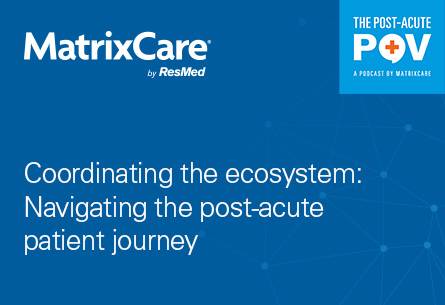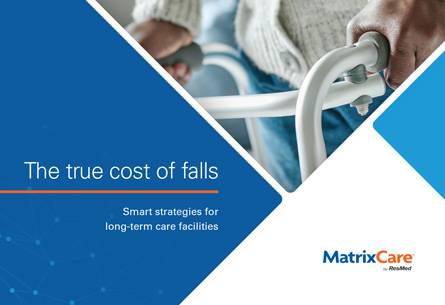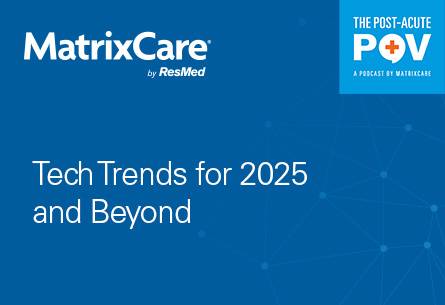In this episode of the Post-Acute POV, our host Kevin Whitehurst, senior vice president of skilled nursing solutions at MatrixCare, is joined by Camille Jordan, RN, BSN, MSN, APRN, FNP-C, CDP, senior vice president of clinical operations and innovation at Signature HealthCARE. The pair have a conversation on optimizing operations using data and analytics across facility-based care.
Join Kevin and Camille as they discuss why it’s becoming increasingly important to be a data-driven organization, how utilizing real-time data and analytics helps staff spend more time with residents, and how technology provides more time for face-to-face interactions by streamlining the gathering of data and other traditionally manual tasks. Listen to their discussion below.
Topics discussed during today’s episode:
- [00:38 – 03:14]: Kevin provides background for the topic and introduces Camille Jordan, our guest from Signature HealthCARE, whose mission is to lead radical change in long-term care.
- [03:39 – 04:12]: Camille explains how data and analytics help Signature’s umbrella of facilities to manage clinical decision-making and ultimately improve resident outcomes.
- [04:19 – 05:08]: Next, Camille describes how it’s becoming increasingly important to be a data-driven organization as the industry and, specifically, healthcare reimbursement models continue to evolve.
- [05:40 – 07:17]: Camille goes on to communicate the importance of being able to gather and display data from across Signature’s 101+ care centers at an enterprise level.
- [07:39 – 09:05]: Next, Camille describes how utilizing real-time data and analytics helps staff spend more time with residents and take a more proactive approach to improve the quality of care they provide. Having analytics at staff’s fingertips also allows them to pinpoint where there are gaps in care, which helps improve staff satisfaction.
- [09:14 – 10:39]: Camille then explains how optimizing operations using data and analytics allows Signature’s staff to be more intentional in its areas of focus, which helps them to grow their business effectively.
- [10:53 – 12:25]: Lastly, Camille comments on how technology should not take away from human connection, but instead provide more time for face-to-face interactions by streamlining the gathering of data and other traditionally manual tasks.
Resources
- Find out more about Signature HealthCARE: https://www.ltcrevolution.com/
- Listen to more episodes of the Post-Acute POV
Transcript
Speaker 1
Hi and welcome to the Post-Acute Point of View, our discussion hub for healthcare technology in the out of hospital space. Here we talk about the latest news and views on trends and innovation that can impact the way post-acute care providers work. And we take a look at how technology can make a difference in today’s changing healthcare landscape in both home based and facility based care organizations and the lives of the people they serve. Today, we hear from Kevin Whitehurst, senior vice president of skilled nursing solutions for MatrixCare and his special guest. Let’s dive in.
Kevin Keith Whitehurst
I’m Kevin Keith Whitehurst, senior vice president, skilled nursing solutions for MatrixCare. I would first like to extend my appreciation and really my gratitude for being part of an industry with so many caring and resilient professionals. Thank you for all you do to improve lives and thank you for joining us today. After 31 years, the one consistent theme that I’ve seen and the one thing that I’ve learned is that care comes first. And with that said, I’ve committed my career to being part of something that I believe really matters and that is really serving all of you. And as a technology partner, I’m proud to be part of the entire experience and I’m going to advocate, innovate and collaborate to ensure that our solutions are meeting your needs.
Kevin Keith Whitehurst
I’m very delighted to talk to our guest today. She is the senior vice president of clinical operations and innovation at Signature Healthcare. Now Signature Healthcare, headquartered in Louisville, Kentucky, is one of the largest, most innovative providers in our industry. And they do believe that a life with a purpose is a life fulfilled. Our guest was named to the Louisville Business First’s 20 people to know in aging care. She has an extensive background in post-acute with master’s in nursing leadership and management and is board certified by the American Academy of Nurse Practitioners in Family Medicine and a certified dementia care practitioner. And that’s only the beginning of her accomplishments and her commitment to this industry. I would like to welcome Camille Jordan and Camille please tell our audience some more about yourself and your perspectives on the clinical executive role.
Camille Jordan
Hi. Good morning, Kevin and all our listeners out there. I am so happy to be here with each of you today and it’s a pleasure to be here and talk to all of the industry leaders. And within the last year of all we’ve had going on, data analytics have been driven to the forefront and even more important than ever. Of course, Signature Healthcare, we’re a family based healthcare company in Louisville, Kentucky, as Kevin said and we offer integrated services across 10 states across the care continuum. Our mission is to lead radical change in longterm care and give the best care that we can to our elders and also to provide a safe working environment to our stakeholders.
Kevin Keith Whitehurs
It’s great to have you here, Camille. Delighted. And now to build on our focus for analytics today, I’m going to be chatting with Camille about the experience she’s had as a leader at Signature Healthcare. Why don’t we get started and just begin at a high level and have you tell our audience, how does Signature use data analytics?
Camille Jordan
Certainly, Kevin. Data analytics helps and I’m in the clinical arm of the organization. Data analytics helps us with clinical decision making and ultimately to look and improve resident outcomes from not only at a facility level but from a macro enterprise level perspective so that we can help identify trends or potential areas of opportunity around key clinical metrics in a near real time fashion. And it allows us to take a more proactive approach around our quality assurance performance improvement process.
Kevin Keith Whitehurs
That’s excellent. Why do you think it’s so important to be a data driven organization in today’s environment?
Camille Jordan
As things continue to evolve, whether it be regulatory, we are seeing that healthcare reimbursement models are continually evolving and changing. This makes our ability to monitor our performance even more critical. Within the industry, it’s important for us to have available infrastructure and tools to help us mitigate risk and make sound business decisions both efficiently and effectively. Signature Healthcare, we’ve always been a data driven organization in which we look for data to identify gaps or opportunities and processes to support our root cause analysis around again, our QuaPy program. Utilizing an analytics dashboard, it provides us both a macro and micro look at our organization from a very large set of data that helps us improve our healthcare delivery and resident outcomes.
Kevin Keith Whitehurst
Excellent. Just hearing about Signature being a data driven organization, in the past, you would not hear about that in our industry. And I think here in the recent years, we’ve seen that transformation in our industry. That’s excellent to hear. Next question, how valuable is it to be able to seize control of all of Signature’s data and compile it into a single resource that your leaders can review and refer to when they’re making decisions?
Camille Jordan
It’s invaluable, Kevin. We’ve always historically relied on our monthly data points, our clinical metric for our leaders to review and to help guide and make QuaPy process and business decision making decisions. To have data compiled into a single resource that provides daily near real time updates is invaluable as it allows us to take a proactive approach and be predictive rather than reactive in trying to solve things that happened over the last week or the last month to better make decisions before systems and processes get out of hand.
Kevin Keith Whitehurst
When we were looking at the survey results, we did see that a lot of the revenue cycle management and on the financial side were really leveraging analytics but where Signature is concerned, how has analytics impacted the clinical operations there as well as the resident care across Signature’s over 100 plus care centers?
Camille Jordan
Having a 101 plus care centers, sometimes it can be hard to get your arms around what’s happening everywhere. To be able to have an enterprise look at where we’re going, we know what our goals and our objectives are as an organization but to see how we’re trending toward those goals, toward those data points that we want to meet is invaluable to be able to pull this up daily and know that it’s refreshing two to three times a day, to be able to pick hotspots and look at where we need to gear our focus and what metrics we need to start hammering in on to get them going back in the right direction.
Kevin Keith Whitehurst
Thank you. We know that staffing is one of the most obvious pain points in our industry today. Has there been any impact on the clinical staff satisfaction, such as reducing the amount of time the staff’s been performing computer based assessments or things like improving the amount of proactive care that your team can deliver?
Camille Jordan
Absolutely. I think from our facility leadership, having this more real time data and not having to be so manual about data collection has allowed our leaders to really take a look throughout the day at what’s going on in their center by unit, drilling into resident data from one source and not having to go resident by resident in the EHR, it’s allowed us to focus more on the bedside care. What are we doing at the bedside? Reducing the amount of time spent gathering that data tracking and trending and just putting out fires. Analytics, it’s allowed our teams to take a predictive and proactive approach toward their QuaPy process rather than on a monthly basis but on a daily basis to allow to improve quality of care resident outcomes. Which in turn equates to staff pride and satisfaction in the care they provide.
Kevin Keith Whitehurst
Absolutely. That sounds good. I know that staff satisfaction is really important for all of our providers out there.
Camille Jordan
It is. And Kevin, can I add something to that question really quick?
Kevin Keith Whitehurst
Absolutely.
Camille Jordan
I apologize. Our staff want to do a good job so having and being able to provide them with continual analytics about where they’re trending on their unit, on their hall, they want to know where they stand and where they sit against their peers. That offers them information to work toward and to ensure that they’re helping the organization and providing the best care that they can.
Kevin Keith Whitehurst
Excellent. Excellent. Would you say that using data analytics gives Signature an edge over its competition? And if so, how?
Camille Jordan
I don’t know so much about an edge per se but it definitely has helped us to improve and look at where we can improve metrics such as our RTH, our falls, even down to the fact of looking at prescriptive medications and we’re in a deprescribing initiative, where are areas that we need to focus or medications that are over prescribed to be able to help our residents to have a better quality of life. I don’t want to say edge over our competitors but it does help us be more intentional about where we focus and it helps us be more intuitive around certain metrics, which allows us to manage and grow our business efficiently.
Kevin Keith Whitehurst
Okay. Where do you think Signature would be today if it didn’t place such a strong emphasis on data and analytics?
Camille Jorda
We would be kind of lost trying to find our way for sure. I think in the industry, we know that COVID has taught us so much. We have to know what’s going on out there. We have to have the data. We have to be able to look at the trends. We have to see where our hotspots are. We would not be able to develop strategies to move our organization forward and become more predictive and prescriptive and intuitive around our care delivery, around our revenue cycle management, et cetera, just overall operations of the organization if we did not have this data compiled into one source to be able to go to and look at several times a day.
Kevin Keith Whitehurst
It’s made a big difference.
Camille Jordan
Definitely. Yes, definitely.
Kevin Keith Whitehurst
How do you see Signature’s use of this technology evolving over time? How will it help you continue to grow and run your successful care centers?
Camille Jordan
It’s become essential to our progression and our strategy growth. We believe it will not replace the human connection and people connection. But it’ll definitely help us to get back to having that human connection because we don’t spend so much time trying to gather data from different sources. It’s there, it’s all aggregated into one dashboard. We’ve focused and realized so much that it’s so important that we’ve actually dedicated a team of individuals that drive our analytics and technology advancements because we do believe technology again does not and should not take the place of focus on human connection and interaction but would help us as a job aid to help our facilities, our stakeholders, to become more effective and efficient in their job task.
Kevin Keith Whitehurst
Do you have any advice for skilled nursing organizations who are considering this technology, those that are thinking about it or pondering the thought or looking at making an investment in their next fiscal year?
Camille Jordan
I think you can’t really quantify the return on investment but I would just encourage everybody not to wait. We know where COVID has put our industry with the staffing crisis. Technology will be more crucial than ever for day to day operations to allow everyone to become more efficient and streamline and work in an effective manner. And to be able to utilize data analytics in near real time and not so retroactive and be reactive, it’ll allow organizations to drive their business metrics both clinically and operationally in a more predictive and intuitive approach.
Kevin Keith Whitehurst
Well Camille, thank you so much for those insights and very impressed with the approach and the evolution from what I’m hearing of Signature Healthcare and really leveraging something like an analytics tool to improve the business, to improve staff satisfaction, to help grow the business, to improve quality of care. All of these things are absolutely critical for providers nowadays. Thank you so much for your time.
Camille Jordan
Thank you Kevin, for having me. I’ve enjoyed speaking with you today. Thank you again.
Kevin Keith Whitehurst
Thank you.
Speaker 1
That concludes the latest episode of the Post-acute Point of View from MatrixCare. We have a lot of guests and topics coming up that you won’t want to miss so be sure to subscribe. If you’ve enjoyed today’s podcast and if you have a topic you’d like us to discuss, leave us a review. To learn more about MatrixCare and our solutions and services, visit matrixcare.com. You can also follow us on LinkedIn, Twitter and Facebook. Thank you for listening. Be well and we’ll see you next time.




